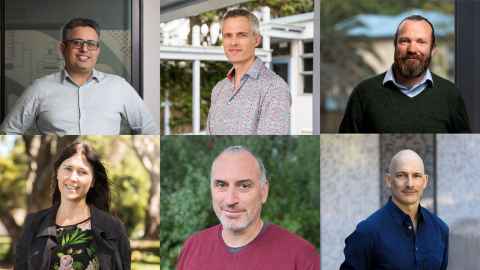Research Impact Awards recognise value to society and environment
20 August 2024
The 2024 Research Impact Award recipients are leading change for the better in Aotearoa, New Zealand.

An online dashboard to monitor social media threats targeting communities with racism and violence; nationwide guidance for the mental health and wellbeing of school children; and two start-ups to recycle hazardous clinical waste safely are among the innovative research projects recognised at the University of Auckland’s Research Impact Awards this year.
Deputy Vice-Chancellor, Research Professor Frank Bloomfield said the awards celebrate how innovative research transforms communities and society for the better. Research impact can have many definitions. For these awards it is defined as the contribution that research and creative practice makes to society, the environment and the economy.
Professor Bloomfield noted the high number of outstanding applications. “Across the University, researchers are working with a broad range of communities and stakeholders to harness the power of excellent research and innovative thinking to address a variety of pressing problems.”
The Research Impact Awards are a category in the University’s Hīkina kia Tutuki – Rise to meet the challenge, Celebrating Research Excellence awards. The recipients of the Research Impact Awards and other research excellence prizes will be formally acknowledged at a special event in October.
The winners of the Research Impact Awards 2024 are:
- Professor Saeid Baroutian, Faculty of Engineering. Professor Baroutian’s research plays a critical role in driving local industry towards a circular economy. Chemical and industrial processes he has developed endeavour to safely recycle clinical waste and waste anaesthetic gas; turn landfill gas into electricity, and turn shell waste into high value pharmacy calcium carbonate products. These are only some examples of his work.
- Team award: Professor Katie Fitzpatrick, Professor Melinda Webber, PVC Māori Associate Professor Te Kawehau Hoskins, Dr John Fenaughty, Associate Professor Darren Powell, Dr Analosa Veukiso-Ulugia and Nic Mason, Faculty of Education and Social Work. The team of University experts developed a national education policy for mental health for schools and students from years 1-13. Their successful aim was to foster a holistic, transdisciplinary approach to mental health and well-being with a Tiriti foundation.
- Team Award: Dr Mark Harvey, Faculty of Creative Arts and Industries and Dr Marie McEntee, Science, for their work on the Mobilising for Action (MFA) theme for the Biological Heritage National Science Challenge. MFA focuses on the human dimensions of forest biosecurity, to develop a collective sense of responsibility for our forests. MFA encompasses a range of research projects, including ways to bring communities into the thinking about how to best deal with kauri dieback.
- Professor Jay Marlowe, Faculty of Education and Social Work. Professor Marlowe is co-director of the Centre for Asia Pacific Refugee Studies (Tāwharau Whakaumu). The centre’s expertise has informed policy on asylum seekers and played a key role in the establishment of the New Zealand Refugee Advisory Panel, ensuring refugee experience and perspectives are part of the policy process. The panel has become a globally renowned model for policy makers.
- Associate Professor Peter Saxton, Faculty of Medical and Health Sciences. Associate Professor Saxton’s research has been instrumental in informing health and government policy for the health of gay men. He has led the largest study of gay and bisexual men and takatāpui in the country for more than 20 years. The research has provided the robust evidence base necessary for impactful policy.
- Chris Wilson, Faculty of Arts. Dr Wilson’s research responds to the aftermath of the terrorist attack on the Muslim community on 15 March 2019. Part of the work has been to develop the tools and frameworks for vulnerable communities to gain agency when targeted. An online dashboard enables community representatives to monitor online postings for potential and actual threats. His work informs government advisory groups created to respond nationally to extremism and hate faced by Muslim, Jewish and Rainbow communities.
Media contact: Gilbert Wong, 021-917942, gilbert.wong@auckland.ac.nz